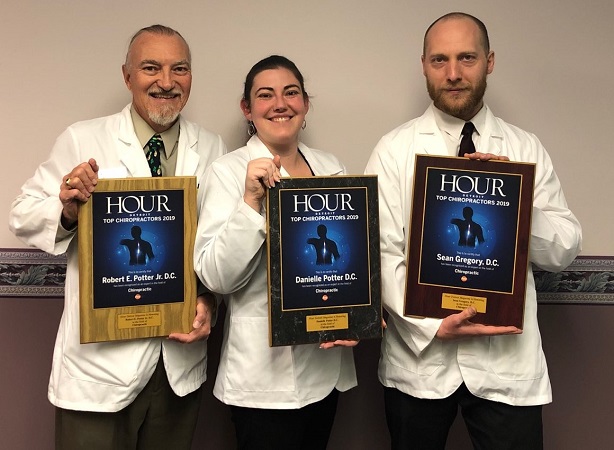When Danielle Potter-Bodenlos graduated from the National University of Health Sciences (NUHS) Doctor of Chiropractic program, her dream was to have her own practice. So she naturally sought the advice of her father, Robert Potter, DC, who graduated 26 years earlier, when it was known as National College of Chiropractic, and had built a successful practice in Canton, MI.
That conversation led to a formal interview for an associate position, with the ultimate goal to one day buy the practice. “He interviewed me the way he would interview anyone applying for the job,” explained Dr. Danielle, as she is known in the practice. “Before we made a commitment, we had a heart-to-heart,” noted Dr. Potter. “I told her ‘I’m Dr. Potter and you’re an associate.’ I set clear professional boundaries and wanted her to understand the seriousness of the agreement we were entering into.”
The arrangement worked well. NUHS graduate Sean Gregory, DC, joined the practice when he was introduced to the Potters through his sister, who had played ice hockey with Dr. Danielle’s sister, Nicole, when they were growing up. When Nicole Brady, DC, graduated from National University in 2014, she also applied and went through the interview process. They were followed in 2018 by NUHS graduate Jessie (Dr. J) Potter, DC, Danielle and Nicole’s cousin.
Their stories tell the path to success for each of them and the Canton Center Chiropractic Clinic.
Robert E. Potter, DC
Robert Potter wanted to be a doctor, “But I didn’t know about chiropractic.” After earning a bachelor of science in medical technology, he worked in a hospital for three years, until a visit to a chiropractor became an “aha moment.”
“The (allopathic) doctor sat across the desk, asked me to raise my arm, and wrote me a script, and that was it,” he recalled. That experience made him decide to give a chiropractor a try. “Before I left I had full range of motion in my shoulder. I knew I wanted to be like him.” Although he looked at other schools, he felt that National was a better fit for him, and it was recommended by his chiropractic physician, a National graduate.
He began his career providing vacation coverage for other chiropractic physicians, then was an associate in a practice focused on personal injuries, and eventually bought an existing practice in 1989. He was a sole practitioner for 10 years before bringing on his first associate.
“When I began, the law in Michigan said I could put hands on the spine only. I couldn’t touch any other part of the body or address other issues, even though I had learned how,” he remembers. Since then, the law has changed and chiropractic medicine is more accepted and sought out, which allowed him to expand his practice.
“I didn’t realize the benefit (of attending National University) until after I graduated,” Dr. Potter remarked. “I was grateful to have a year of nutrition study, which I’ve learned to use as a match-up to chiropractic care.” He also takes pride in the diagnostic skills he learned, which makes him more confident identifying illnesses that are not related to the spine, and better able to determine if patients should be referred to another doctor. “National made me more well-rounded,” he said. “That made me more successful.”
With trusted associates who he feels will treat his patients with the same level of care that he does, he is able to take more time off. And, with Dr. Danielle’s goal to be her own boss and take over the practice, he said, “She’s my exit strategy one day.”

Danielle Potter-Bodenlos, DC
Dr. Danielle was born shortly before her father graduated from NCC, and she dreamed of “doing what dad did, but for animals.” But when veterinary school didn’t work out, she turned her focus to treating people. “I heard from him and his friends how great the education (at National University) was,” she explained, adding that she thought it was “cool” that he had such a strong bond with many lifelong friends from his National College days.
“I appreciate that you are taught how to do a thorough exam,” she remarked. “I can evaluate the abdomen or chest, and patients can bring me their blood work results and I know what’s going on.” She added that her education made her very competitive with other doctors. “I can talk to a patient just as well as they can, or send a patient to the ER when needed. It makes me feel very confident in my diagnostic skills.”
She has developed a specialization in autism spectrum, learning disabilities and nutrition, and appreciates that others within the practice are able to refer patients to her, and vice versa. “Working in a multi-doctor practice you get a different view.” One of the benefits of working in a family practice is the flexibility for her and Dr. Brady to bring their children to work on occasion. Getting guidance from their dad, she says, “That’s a bonus!”
Nicole (Potter) Brady, DC
“I was an athlete growing up, so dad was able to put me back together so I could continue to play,” laughed Dr. Brady. While she initially planned to pursue a career in athletic training, she felt that she could do more as a chiropractic physician. When she became pregnant her last year in school, “My classmates had a chance to work on me!” That experience led her to specialize in prenatal and postpartum care.
Despite a family legacy of National University graduates, she “did the fact check” on the school for herself, and advises others to do the same. “It’s a good education,” she noted, pointing out that it’s similar to a primary care doctor’s education. “I have a lot of patients who are surprised when I start doing a physical exam because they have been to other chiropractors who don’t do that,” she explained.
She appreciates working in a family practice where they are able to bounce ideas off each other, even during Sunday family dinners.
Sean Gregory, DC
Dr. Gregory grew up in a health-conscious family. When he began looking at graduate programs, his interest was in physical activity and health beyond traditional medical practice. While other chiropractic programs had what he called a “religious view of chiropractic,” he was drawn to National University’s science-based approach.
In addition to providing him with a strong understanding of physiology and how to be analytic, Dr. Gregory appreciates that he also learned “to communicate in an effective way with patients” at NUHS. He pointed out that, “At the end of the day, if you can’t communicate with your patients, they won’t make the changes that are needed.”
Since graduating, he has extended his education to include physical rehabilitation, sports medicine and nutrition, and enjoys being in a practice with fellow alumni. “It give us a similar framework to build from. When we talk pathology and diagnosis, we are working with the same terminology,” he said. He also likes working within a family dynamic. “Dr. Potter doesn’t play favorites in terms of family. Everyone is on the same playing field.”
Jessie L. Potter, DC (Dr. J)
Dr. J took a different route to the family practice, which she joined in 2018. She was in nursing school before deciding to complete her bachelor’s degree in NUHS’ Biomedical Science program. While she knew about the university through the family connection, it appealed to her to finish her bachelor’s there before moving into the chiropractic program because it helped her to know the school and the faculty. “I had some of the same professors as an undergrad, which helped with the transition to the graduate program, although the course load was very different!” she joked.
Growing up, she thought what her uncle did was cool, and she determined that she didn’t just want to make people comfortable, she wanted to help them live healthier lives and maintain their health, as he did. “National University made me very equipped to understand systems and processes besides the spine,” Dr. J stressed. “It helped make me a better doctor. We were taught to look at things in a critical way.”
She feels that working with family members has provided a good atmosphere to “learn from people I admire and respect.” As the most recent graduate and newest member of the practice, she appreciates being able to collaborate with them, concluding, “I wanted to be able to stand toe-to-toe with other doctors, and I feel I’m in a good spot to grow my experience and knowledge.”
{{cta(’49a178ed-da3e-44b5-ac67-6727ab90bc5f’)}}




0 Comments